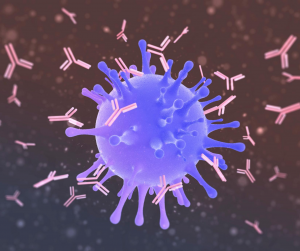Investigate potential differences in adrenergic and muscarinic receptor autoantibody levels in plasma and cerebrospinal fluid (CSF) samples between ME/CFS patients and healthy controls, examine why these autoantibodies start to show up in the disease process and how we might positively impact this process with various drug targets and immune regulatory treatments. Being able to explain these underlying mechanisms may provide the validation needed for specific ongoing treatments.
Collection of data from expanded ME cohort and COVID cohort ongoing and should be ready for evaluation in fall 2023. Analysis in Berlin planned for.
The development of autoimmune antibodies is a consistent finding across HSE, ME/CFS, Long COVID and provide a window into the neurocognitive disturbances, peripheral symptoms, POTS, pain, and other targets of these autoantibodies.
Previously, autoantibodies have been observed to have increased binding to adrenergic and muscarinic receptors in ME/CFS patients. It is hypothesized
that these autoantibodies may be part of the pathogenesis of ME/CFS and patient symptom.
 Plasma, CSF and health-related questionnaires were collected from two Swedish ME / CFS cohorts, plasma and CSF from one of the cohorts (n=24), only plasma from the second cohort (n=24) together with plasma samples (n=24) and CSF (n=6) from healthy controls.
Plasma, CSF and health-related questionnaires were collected from two Swedish ME / CFS cohorts, plasma and CSF from one of the cohorts (n=24), only plasma from the second cohort (n=24) together with plasma samples (n=24) and CSF (n=6) from healthy controls.
All samples were analyzed for IgG autoantibodies directed against adrenergic and muscarinic receptors ELISA technique. The questionnaires were used as measures of disease severity.
This study has been published in Brain, Behavior and Immunity – Health
OMF is a non-profit 501(c)(3) organization
(EIN# 26-4712664). All donations are tax-deductible to the extent allowed by law.



Open Medicine Foundation®
29302 Laro Drive, Agoura Hills, CA 91301 USA
Phone: 650-242-8669
info@omf.ngo
Copyright © 2023 Open Medicine Foundation. All Rights Reserved.
What are the advantages of giving from your Donor Advised Fund (DAF)?
How do I make a donation through my DAF?
Just click on the DAF widget below. It is simple and convenient to find your fund among the over 900 funds in our system.
Still can’t find your fund?
Gifting of Stock
Broker: Schwab
DTC #: 0164
Account #: 47083887
Account Registered as:
Open Medicine Foundation
29302 Laro Drive
Agoura Hills, CA 91301
Please speak to your personal tax advisor and then email or call OMF at 650-242-8669 to notify us of your donation or with any questions.